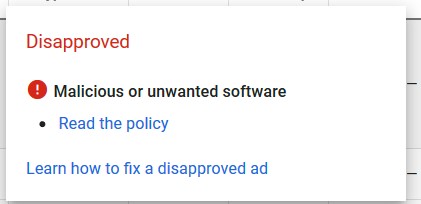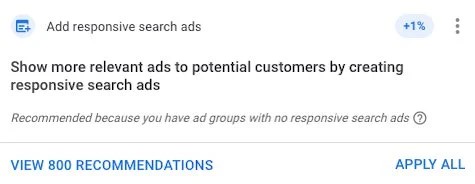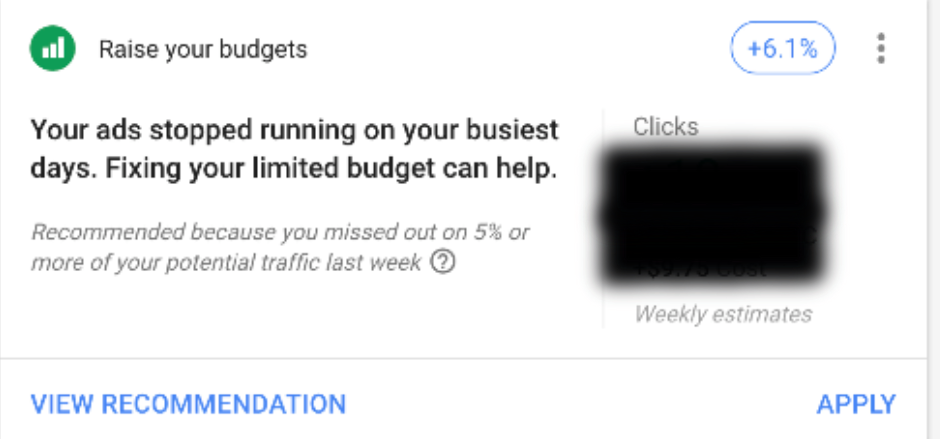As digital marketing professionals, we live in a sea of Google Ads recommendations. It’s as if the friendly blue suggestion box has an octopus’ bed of infinite “optimization” ideas. But should you apply all the Google Ads recommendations you receive?
The short answer: Not.
Recommendations from Google can be anywhere from truly helpful to potentially harmful to your particular campaign objectives. This ultimate guide will help you to know which Google Ads recommendations you need to act on right away, which you should consider, and which are a waste of your time.
Related Article: https://www.adlabz.co/why-most-b2b-saas-lead-magnets-dont-drive-leads
Table of Contents
Why Does Google Even Give Recommendations?
Google Ads recommendations are algorithmically generated tips that are tailored for your account based on performance data, industry benchmarks, and machine learning from Google. Assuming these recommendations are all designed to funnel us toward Google’s coffers is a gross oversimplification:
- Ad relevance: The majority of recommendations are geared towards improving the user experience
- More advertiser success: Advertisers who succeed keep using the platform.
- Yes, driving Google revenue up: To be frank, some recommendations do lead to increased spend
So, let’s get into the recommendations and how you must go about it in that context.
Which Google Ads Recommendations Should You Always Use?
Should You Fix Disapproved Ads Immediately?
VERDICT: USE
This one is probably the easiest to implement. Disapproved ads are not serving, costing you valuable clicks and conversions. When Google identifies disapproved ads, resolve the issues quickly by:
- So Again, Reading the Specific Policy Violation
- Making adjustments to ad copy or landing pages as needed
- Resubmitting for approval
At the same time, this recommendation does not increase your budget and helps to solve a functional problem in your account.

Should You Add Responsive Search Ads to Ad Groups?
VERDICT: USE
Since expanded text ads are going away, responsive search ads (RSAs) are now the default. If Google suggests RSAs to ad groups that don’t yet have them, you should follow the advice because:
- With RSAs, there are more combinations to test creatively
- Display the most relevant message to each user and they usually lead to higher click-through rates
- Ad groups without RSAs may significantly underperform
Just make sure to give different headings and descriptions while still sticking to your main message but with some flexibility.

Should You Fix Broken URLs and Landing Page Issues?
VERDICT: USE
Landing page problems affect both the user experience and conversion rates. Fix all broken URLs and any major landing page problems Google identifies as soon as Google spots them:
- Look for 404 errors; slow loading times; or mobile-unfriendly
- Make sure your tracking parameters aren’t breaking URLs
- Make sure your landing pages are aligned with your ad content
This suggestion protects against wasted spend on clicks that cannot convert and puts a stop to a negative impact on quality score.
Which Google Ads Recommendations Should You Carefully Evaluate?
Should You Apply Smart Bidding Strategies as Recommended?
VERDICT: EVALUATE
Bidding strategies: These are grouping features aligned with your overall goals, such as maximizing conversions, and utilizing machine learning to optimize your bids on driving conversions or conversion value. But they only work when they’re right for you:
When to use the recommendation:
- Your account has enough conversion history (ideally 30+ conversions in 30 days)
- You know what your conversion goals are, and what imprint you are creating with that goal.
- Your business can afford minor performance variations in the interim.
When to ignore it:
- You have limited or no conversion data to work with
- You work in a highly regulated industry with specific compliance requirements
- You find it necessary to have total control over where and when your ads appear
Always deploy smart bidding strategies with a testing perspective—keep a close eye on performance and be ready to roll back if your results careen downward.
Should You Increase Your Daily Budgets When Recommended?
VERDICT: EVALUATE
Recommendations for increasing a budget need to be carefully considered:
Аnalysis process before implementation:
- Determine if you’re truly losing impression share because of a budget issue
- Ensure the campaigns are achieving performance objectives
- Number of new visitors you can expect to receive as a result of this marketing campaign.
If a campaign is already profitable, and limited by budget, it often makes sense to increase spend. But when performance isn’t great, pouring more money into it generally doesn’t lead to better results.

Should You Expand Your Keyword Match Types?
VERDICT: EVALUATE
Google often recommends expanding match types to get more traffic:
Consider implementing when:
- Your campaigns convert well, and you want more scale
- You have strong negative keyword lists that will ignore toters
- You’ve implemented smart bidding to help manage costs associated with broader traffic
Approach with caution when:
- You are heavily limited in your budget and need it to be highly targeted
- You work in a sector with many comparable but unrelated search phrases
- Brand safety, however, is a major concern
Don’t yawn and accept, test expanded match types with experimental campaigns while protecting your main performance.
Which Google Ads Recommendations Should You Usually Ignore?
Should You Remove “Redundant” Keywords?
VERDICT: IGNORE
Google frequently recommends that you eliminate keywords it believes to be redundant because they supposedly compete with one another. You mostly can (and should) ignore this recommendation because:
- However, many of those “redundant” keywords are different intent signals
- This overlap gives you data on where the best variations lie
- By consolidating to fewer keywords, you lose your granularity of control
You are not removing them, you are just lowering bids based on differences in performance between similar keywords.

Should You Let Google Automatically Apply Recommendations?
VERDICT: IGNORE
Google provides the ability to get some recommendations automatically applied. This feature should rarely be used because:
- It takes away your strategic control over key account decisions
- Most of the recommendations need to be evaluated in the context of specific populations
- Auto-apply changes can make big adjustments to spending and targeting without notice
Keep in mind that recommendations should be manually reviewed (where feasible) to ensure they meet your unique business objectives and fit within the campaign strategy.
Should You Always Add Every Suggested Keyword?
VERDICT: IGNORE
Google Keyword Suggestions tend to go into a lot of terms related tangentially. Take these recommendations with a grain of salt(sty) because:
- The suggested keywords may honor a different intent than the objectives of your campaign
- Over keywording may spread your budget over less relevant traffic
- That is how some suggestions may be competitive terms at high CPCs but low conversion potential
Rather, do thorough research on each one , using search volume, competition, and, most importantly, relevance to your specific offerings.
How Can You Develop Your Own Google Ads Recommendation Strategy?
A consistent evaluation framework is paramount to effectively deal with Google Ads recommendations:
- Align with outcomes: Does this recommendation align with your specific campaign outcomes?
- Think about cost implications: Will implementing this change generate more spending without a similar performance improvement?
- Evaluate control sacrifices: What control are you giving up to automation?
- Test in a big way: Debatably, the best way to know you have a winner is to launch it widely.
- Nose to Grindstone: Review historical context: Have similar recommendations helped or hurt performance in the past?
Wrapping up
When using them with the right mentality, recommendations in Google Ads can be helpful tools. The most successful advertisers treat them as recommendations to be considered rather than orders to be obeyed. This approach groups recommendations into buckets of things to use, evaluate, and ignore, saving time but still leveraging some of the insights provided by Google in the areas where they do add value.
And always keep in mind that your particular business context is more important than generic advice of any nature—even if that means advice coming from Google. Given your campaign goals, industry, competition, and budget constraints, your situation is unique and thus requires careful consideration for every change you make.
What has been your experience with Google Ads recommendations? Are there any particular pieces of advice that have repeatedly proved helpful or harmful to your campaigns? Let us know your thoughts in the comments section!
You might also be interested:


